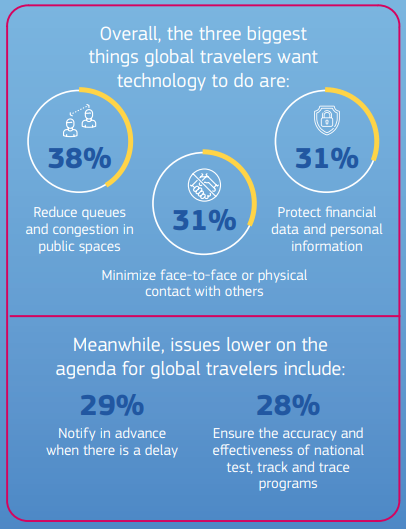A recently published global traveller study by global insight-driven research firm Censuswide to explore traveller sentiment in light of COVID-19, how expectations and demands have changed and what can be put in place to strengthen traveller trust and confidence, gives some insight into the future outlook.
The Sep-2020 research for travel technology specialist Amadeus, based on more than 6,000 respondents residing in France, Germany, India, Singapore, UK and US who have travelled abroad in the last 18 months may be dated a little by sentiment trends. However, it still illustrates some key differences across countries and demographics that could help the travel industry and governments address top concerns about travelling in the next 12 months.
The study found a clear role for technology to play in supporting recovery with over four in five (84%) travellers saying technology would increase their confidence to travel in the next 12 months by addressing concerns around mixing with crowds, social distancing and physical touchpoints.
When asked about technologies or technology experiences that would increase confidence to travel in the next year or make them more likely to travel, survey results showed that two in five (42%) believe mobile applications that provide on-trip notifications to inform about localised outbreaks and changes to government guidance would help boost their confidence to travel. The same number (42%) cited contactless and mobile payment options such as Google Pay, PayPal and Venmo as key to reducing incidences of physical contact throughout the journey.
More than a third (34%)of travellers who have concerns about travelling in light of COVID, identified biometrics (i.e. facial or voice recognition) that enable check-in, pass-through security and boarding without the need for physical checks would make them more likely to travel. Similarly, a third (33%) agreed they would like one universal digital traveller identification on their phone that includes all necessary documentation and immunity status, that meant they only had to prove it once.
Notably, and perhaps an indication of contrasting sentiment across different countries at the time of the survey as much as regional and age differentiation, it was found that technology receptiveness and preferences differ by country and demographic, underscoring the importance of personalisation in gaining traveller trust.
The findings showed that almost half (47%) of Baby Boomers said they would need to be able to socially or physically distance throughout the journey in order to feel comfortable travelling, compared to less than 3 in 10 (27%) of Generation Z.
Amadeus also identified that over half (52%) of travellers in Singapore who have concerns about travelling in light of COVID selected contactless experiences at hotels as a technology that would make them more likely to travel, while almost half of Indian travellers who have concerns about travelling in light of COVID (47%) selected mobile applications that inform them of the destination city's safety measures.
Additionally, for French travellers, automated cleaning processes (36%) and contactless and mobile payments (34%) were the most popular of the suggested technology options. A quarter (25%) of UK travellers and just over a quarter (26%) of US travellers said they'd most like technology to reduce the need for them to have physical documents. Meanwhile, three in ten German and UK travellers (30% each) said they'd most like technology to minimise their physical contact with others. You can access and download all the individual country reports via the Amadeus website.
At an global level the top five things travellers would most like technology to do when thinking about travel was found to be to reduce queues and congestion in public spaces (38%); minimize face-to-face or physical contact with others (31%); protect financial data and personal information (31%); notify in advance when there is a delay (29%); and ensure the accuracy and effectiveness of national test, track and trace programmes (28%).

Ultimately, as stakeholders work to rethink travel, the survey results suggest that the top five ways to build traveller confidence under current conditions comprise provide access to flexible change, cancellations policies and payment terms to avoid losing money (39%); limiting the number of passengers on a plane (38%); an ability for travellers to socially or physically distance themselves throughout the journey (36%); having visibility to and assurance of sanitisation, hygiene and safety measures in hotels and accommodations (36%); and effective test, track and trace programmes being in place (34%).
The travel industry had already been on a journey of technological change ahead of COVID-19, but this was patch at best. With the industry being hurt hard by coronavirus this latest research provides a source of optimism for the industry that many travel concerns can be addressed by technology adoption across all stages of the journey. The positive news is that much of this technology such as new mobile applications, biometrics and contactless solutions is available right now, there is simply a need to accelerate adoption and deployment.